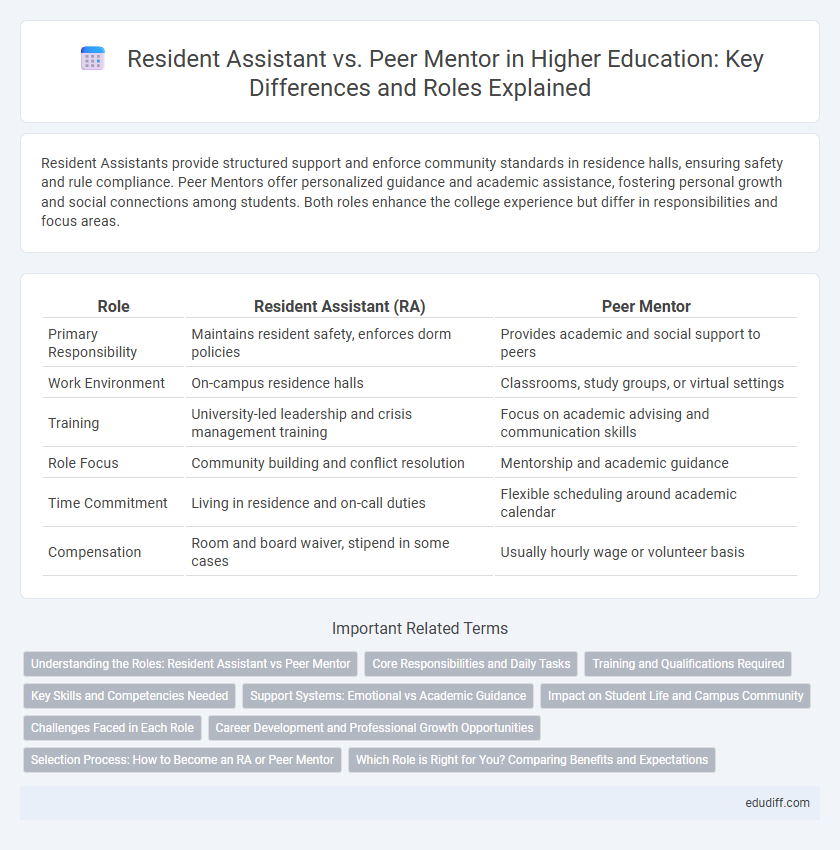Resident Assistants provide structured support and enforce community standards in residence halls, ensuring safety and rule compliance. Peer Mentors offer personalized guidance and academic assistance, fostering personal growth and social connections among students. Both roles enhance the college experience but differ in responsibilities and focus areas.
Table of Comparison
| Role | Resident Assistant (RA) | Peer Mentor |
|---|---|---|
| Primary Responsibility | Maintains resident safety, enforces dorm policies | Provides academic and social support to peers |
| Work Environment | On-campus residence halls | Classrooms, study groups, or virtual settings |
| Training | University-led leadership and crisis management training | Focus on academic advising and communication skills |
| Role Focus | Community building and conflict resolution | Mentorship and academic guidance |
| Time Commitment | Living in residence and on-call duties | Flexible scheduling around academic calendar |
| Compensation | Room and board waiver, stipend in some cases | Usually hourly wage or volunteer basis |
Understanding the Roles: Resident Assistant vs Peer Mentor
Resident Assistants (RAs) primarily oversee dormitory management, enforce housing policies, and provide crisis intervention, while Peer Mentors focus on academic support, personal development, and social integration within the student community. RAs typically receive specialized training in conflict resolution and emergency response, whereas Peer Mentors are selected for their expertise in specific subject areas or shared experiences with mentees. Both roles foster community building and student success but operate in distinct capacities addressing different aspects of campus life.
Core Responsibilities and Daily Tasks
Resident Assistants (RAs) primarily focus on maintaining safety, enforcing residence hall policies, and fostering a supportive living environment through organized programs and conflict resolution. Peer Mentors concentrate on academic guidance, providing emotional support, and facilitating study groups or workshops to enhance student success. Both roles require strong communication skills, but RAs manage community logistics while Peer Mentors emphasize individual growth and learning.
Training and Qualifications Required
Resident Assistants undergo rigorous training in crisis management, conflict resolution, and residential policies, often requiring completion of extensive on-campus programs and leadership workshops. Peer Mentors typically receive targeted training focused on academic support, communication skills, and campus resource navigation, with qualifications emphasizing successful academic performance and interpersonal abilities. Both roles demand strong leadership skills but differ in the depth and scope of their preparatory training aligned with their specific responsibilities in student support.
Key Skills and Competencies Needed
Resident Assistants require strong conflict resolution abilities, crisis management skills, and knowledge of campus policies to maintain a safe residential environment. Peer Mentors must excel in active listening, academic advising, and empathetic communication to effectively support student development. Both roles demand leadership, cultural competence, and interpersonal skills to foster inclusive and supportive communities.
Support Systems: Emotional vs Academic Guidance
Resident Assistants primarily provide emotional support by fostering a safe and inclusive community, addressing residents' personal concerns, and promoting wellness initiatives. Peer Mentors concentrate on academic guidance, offering study strategies, connecting students with educational resources, and facilitating skill development for academic success. Both roles are essential to a holistic support system, addressing distinct but complementary aspects of student well-being.
Impact on Student Life and Campus Community
Resident Assistants (RAs) foster a supportive living environment by managing residence halls, resolving conflicts, and organizing community-building activities, directly enhancing students' daily campus experience. Peer Mentors provide academic guidance and emotional support, helping students navigate coursework and campus resources, which boosts retention and academic success. Both roles significantly contribute to student well-being and strengthen the campus community through personalized support and engagement initiatives.
Challenges Faced in Each Role
Resident Assistants face challenges such as managing conflicts between residents, enforcing housing policies, and providing crisis intervention around the clock. Peer Mentors encounter difficulties in guiding academic progress, maintaining boundaries while offering emotional support, and adapting mentorship to diverse student needs. Both roles require resilience and strong communication skills to address the unique pressures inherent in their responsibilities.
Career Development and Professional Growth Opportunities
Resident Assistants gain hands-on leadership experience managing community dynamics, conflict resolution, and crisis response, which are highly valued in careers like social work, education, and counseling. Peer Mentors concentrate on academic support and personal development strategies, fostering skills in tutoring, communication, and guidance applicable to roles in coaching, human resources, and academic advising. Both positions enhance professional growth by building transferable skills, networking opportunities, and resume credentials essential for career advancement in education and student services.
Selection Process: How to Become an RA or Peer Mentor
The selection process to become a Resident Assistant (RA) typically involves submitting an application, attending interviews, and completing group activities to assess leadership and conflict resolution skills. Peer Mentor candidates often undergo an application process followed by a one-on-one interview, emphasizing academic performance, communication abilities, and peer support experience. Both roles require demonstrating strong interpersonal skills and commitment to fostering a supportive campus community.
Which Role is Right for You? Comparing Benefits and Expectations
Resident Assistants provide structured leadership in residence halls with responsibilities including conflict resolution, event planning, and enforcing housing policies, making it ideal for students seeking hands-on management experience. Peer Mentors focus on academic support and personal development, offering guidance and resources to help peers navigate college life, which suits those passionate about tutoring and emotional support. Choosing between the two depends on whether you prefer administrative duties and community enforcement or nurturing peer relationships and fostering academic success.
Resident Assistant vs Peer Mentor Infographic

 edudiff.com
edudiff.com